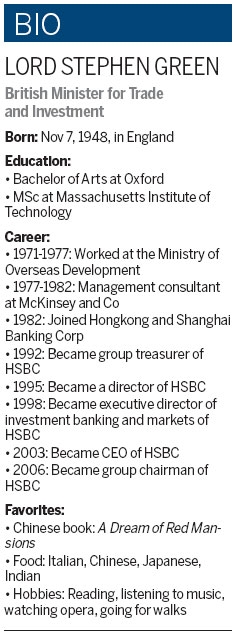A trade lord who cherishes the small

|

Stephen Green hopes more British small- and medium-sized companies can do business with China. [Diao Ying / China Daily]
|
Former chairman of hsbc looks to connect more growing British companies to China
Lord Stephen Green has had a ringside view of China's economic miracle over the past decade.
That experience, when he was group chairman of HSBC Holdings Plc, has convinced him of the incredible opportunities China's growth offers, a lesson he now freely shares with British businesses as Britain's Minister for Trade and Investment.
"China is rapidly becoming one of the most important trade partners for Britain," Green says.
"This reflects the rapid emergence of China on the world stage, as the second-largest economy, becoming increasingly broad based and increasingly sophisticated."
|

|
China is Britain's second-largest trading partner outside the European Union. Bilateral trade between China and Britain grew to more than $60 billion (46 billion euros) last year, an increase of more than 200 times the $300 million in 1972 when the two countries first established a full diplomatic relationship.
Green takes this as evidence that the two countries' trade is on track to reach $100 billion a year by 2015, a target agreed between Chinese Premier Wen Jiabao and British Prime Minister David Cameron in 2010.
British firms have a growing interest in China, Green says. "What's clear in China is that the Chinese middle-class consumers want the same branded goods as everywhere else."
Famous British brands such as Jaguar, Rolls-Royce, Burberry and various makers of Scotch whisky are now heavily relying on the Chinese market to boost sales, but Green is keen to encourage more small- and medium-sized businesses to engage more with Chinese consumers.
"It's not that SMEs are more important than the big companies; it is that the big companies tend to know what they are doing there."
As such, he says UK Trade & Investment will step up efforts to connect companies with established exporters and will work alongside the Export Credits Guarantee Department, which will market its new range of trade credit services geared toward smaller companies.
"About a third of Britain's exports come from small companies, but I think more can come from small companies."
Almost 60 percent of private sector jobs in Britain are reckoned to have been created by SMEs.
To help British businesses export more to China, the commercial diplomacy department of the Foreign and Commonwealth Office and UK Trade & Investment are in the process of deploying 50 staff in China. A new British consulate will open in Wuhan, Hubei province, soon.
Green says Britain can offer China exports in a diverse range of areas, including traditional manufacturing, engineering, design, architecture, engineering consultancy and financial services.
It is Britain's strength in these industries and China's push for its companies to go global that have led Chinese companies to increase investments in Britain.
Many Chinese companies have grown a presence in Britain, ranging from Shanghai Automotive's subsidiary MG car plant, which employs 400 people in Birmingham, to China Telecom's European subsidiary, whose headquarters are in Britain, providing services across Europe.
Another type of industry Britain hopes to attract Chinese interest in is infrastructure. The British government plans to invest 200 billion pounds ($312 billion, 245 billion euros) to develop the country's infrastructure in the five years to 2015, but much of this funding will need to come from the private sector and foreign investors.
China welcomed Britain's offer when the two countries signed a memorandum of understanding on infrastructure in September.
China Investment Corp, the country's sovereign wealth fund, made the first infrastructure investment in January by buying an 8.68 percent stake in Britain's largest water and sewage company, Thames Water.
Citic Construction Co, another Chinese sovereign wealth fund, has also expressed interest in a number of infrastructure projects, including the Atlantic Gateway, offshore wind farms in Scotland, the Battersea power station and the UK Olympic Park.
Green believes British infrastructure provides opportunities for "stable long-term investments for good returns" for the next 20 or 30 years.
"There is no prejudice against overseas investors. If you compare Britain with a number of European and North American opportunities, this is the most open market there is for investments in the developed markets."
About 40 percent of Britain's economic output is driven by foreign investments, compared with 20 percent in Germany and 10 percent in the United States, Green says.
Offshore wind, transport, broadband, water and waste are all areas where opportunities for equity investment exist, he says.
China's investment in Britain has grown to more than $2.3 billion, of which half of these investments were made last year.
Much of China's growing investments abroad are fueled by its rapid growth at home, but China announced in March that its GDP target for this year would be lowered to 7.5 percent.
This message caused a stir in the international financial markets, but Green remains confident.
"China is working toward balanced growth. In China, everyone recognizes that the growth in some past years has been led too much by exports and investments and not enough by consumption and domestic demand 7.5 percent is still a growth rate any government in this part of the world regard as quite rapid, but more sustainable."
For Green, China's growth is not just headline numbers. He first went to Beijing and Shanghai in 1984 as a young banker for HSBC, and witnessed China's growing traffic and shopping malls - two distinctive features of China's modern cities.
HSBC's origins date to 1865, when it operated as the Hongkong and Shanghai Banking Corp to finance trade in opium, silk and tea. Today it focuses on emerging markets and gets about a third of its operating profit from Hong Kong.
Green's career at the HSBC spanned almost three decades, during which he lived in Hong Kong for years and traveled to about 20 Chinese cities.
He was determined also to learn the language and became the first student in the Confucius Institute at the London School of Economics, when it opened in 2006.
"Unfortunately I did not have enough time to devote to it, so I'm not a very good student, and I need to properly retire from doing this job to devote enough time to really master the language.
"But I enjoyed it, including learning the characters".
At the HSBC, Green prized diversity and worked with an international mindset.
In 2003 he was criticized after he decided to move 4,000 call center and processing jobs from Britain to India, China and Malaysia.
The British finance union Unifi was vociferous, but Green maintained that it was an important move to manage the company's resources internationally in the most cost-effective manner.
The Guardian quoted him as saying: "It can't be the right response to say that emerging markets have no right to jobs."
With so much experience working with emerging markets, it is no surprise that Cameron appointed Green as minister for trade and investment in January last year, when Britain needed to maintain its international competitiveness by engaging with growing markets.
Unlike most politicians, Green considers himself a "retired banker", but he says he enjoys his new role enormously. The job at UK Trade & Investment also gives him great responsibility. "The range of issues you have to grasp, the policy issues you have to deal with, is much broader in the public sector."
His new role offers him plenty of chances to visit China. For instance he will take a British trade delegation to the annual China International Fair for Trade in Services in May.
"The fact that I go to China twice a year now, and continue to be involved in an exciting environment, particularly in Asia where I have lived before, is a great aspect to the job."
But he looks forward to some relaxing moments without his ministerial hat on. "I haven't spent as much time as I would have liked in China's countryside, in the old monuments and buildings, and I look forward to visiting them."
Contact the writers at cecily.liu@chinadaily.com.cn and diaoying@chinadaily.com.cn
Today's Top News
- Xi calls for promoting volunteer spirit to serve national rejuvenation
- Xi chairs CPC meeting to review report on central discipline inspection
- Reunification will only make Taiwan better
- Outline of Xi's thought on strengthening military published
- Targeted action plan to unleash consumption momentum
- Separatist plans of Lai slammed






























